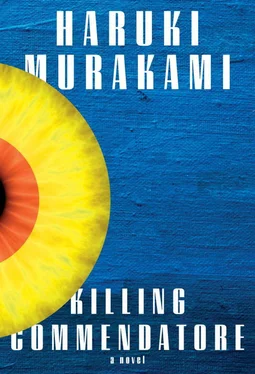The term “commendatore” sparked a faint memory. I’d heard the word before. I followed that trace of memory, as if tugging a thin thread toward me. I’d run across the word in a novel or drama. And it was a famous work. I knew I’d seen it somewhere…
And then it hit me. Mozart’s opera Don Giovanni . In the beginning of that opera was a scene, I was sure, of Killing Commendatore . I went over to the shelf of records in the living room, took out the boxed set of Don Giovanni , and read through the accompanying commentary. And sure enough, the person killed in the opening scene was the Commendatore. He didn’t have a name. He was simply listed as “Commendatore.”
The libretto was in Italian, and the old man killed in the beginning was called Il Commendatore . Whoever translated the libretto into Japanese had rendered it as kishidancho —literally, “the knight commander”—and that had become the standard term in Japanese. I had no clue what sort of rank or position the term “commendatore” referred to in reality. The commentary in a few other boxed sets didn’t elaborate. He was merely a nameless commendatore appearing in the opera with the sole function of being stabbed to death by Don Giovanni in the opening of the opera. And in the end he transformed into an ominous statue that appeared to Don Giovanni and took him down to hell.
Pretty obvious, if you think about it, I thought. The handsome young man in this painting is the rake Don Giovanni (Don Juan in Spanish) and the older man being killed is the honored knight commander. The young woman is the Commendatore’s beautiful daughter Donna Anna, the servant is Don Giovanni’s man, Leporello. What he had in his hands was the detailed list of all the women Don Giovanni had seduced up until then, a lengthy catalog of names. Don Giovanni had forced himself on Donna Anna, and when her father confronted him with this violation, they had a duel, and Don Giovanni stabbed the older man to death. It’s a famous scene. Why hadn’t I picked up on that?
Probably because Mozart’s opera and a Japanese-style painting depicting the Asuka period were so remote from each other. So of course I hadn’t been able to make the connection. But once I did, everything fell into place. Tomohiko Amada had “adapted” the world of Mozart’s opera into the Asuka period. A fascinating experiment, for sure. That, I recognized. But why was that adaptation necessary ? It was so very different from his usual style of painting. And why did he tightly wrap the painting and hide it away in the attic?
And what was the significance of that figure in the bottom left, the man with the long face sticking his head out from underground? In Mozart’s Don Giovanni no one like that appeared. There must have been a reason Tomohiko Amada had added him. Also in the opera Donna Anna didn’t actually witness her father being stabbed to death. She was off asking her lover, the knight Don Ottavio, for help. By the time they got back to the scene, her father had already breathed his last. Amada had—no doubt for dramatic purposes—subtly changed the way the scene played out. But there was no way the man sticking his head out of the ground was Don Ottavio. That man’s features weren’t anything found in this world. It was impossible that this was the upright, righteous knight who could help Donna Anna.
Was he a demon from hell? Scouting out the situation in anticipation of dragging Don Giovanni down to hell? But he didn’t look like a demon or devil. A demon wouldn’t have such strangely sparkling eyes. A devil wouldn’t push a square wooden lid up and peek out. The figure more resembled a trickster who had come to intervene. “Long Face” is what I called him, for lack of a better term.
—
For a few weeks I just silently stared at that painting. With it in front of me, I couldn’t bring myself to do any painting of my own. I barely even felt like eating. I’d grab whatever vegetables were in the fridge, dip them in mayo, and chew on that, or else heat up a can of whatever I had on hand. That’s about the size of it. All day long I’d sit on the floor of the studio, endlessly listening to the record of Don Giovanni , staring enthralled at Killing Commendatore . When the sun set, I’d have a glass of wine.
The painting was amazing. As far as I knew, though, it wasn’t reprinted in any collection of Amada’s work, which meant no one else knew it existed. If it were made public it would no doubt become one of his best-known paintings. If they held a retrospective of his art, it wouldn’t be surprising if this was the painting used on the promotional poster. This wasn’t simply a painting that was wonderfully done, though. The painting was brimming with an extraordinary sort of energy. Anyone with even a little knowledge of art couldn’t miss that fact. There was something in this painting that appealed to the deepest part of the viewer’s heart, something suggestive that enticed the imagination to another realm.
I couldn’t take my eyes off the bearded Long Face on the left side of the painting. It felt like he’d opened the lid to invite me, personally, to the world underground. No one else, just me . I couldn’t stop thinking about what sort of realm lay beneath. Where in the world had he come from? And what did he do there? Would that lid be closed up again, or would it be left open?
As I stared at the painting I listened to that scene from Don Giovanni over and over. Act 1, scene 3, soon after the overture. And I nearly memorized the lyrics and the lines.
DONNA ANNA: Ah, the assassin
has struck him down! This blood…
this wound… his face
discolored with the pallor of death…
He has stopped breathing… his limbs are cold.
Oh father, dear father, dearest father!
I’m fainting… I’m dying!
6
AT THIS POINT HE’S A FACELESS CLIENT
Summer was winding down when the call came in from my agent. It had been a while since anyone had called me. The summer heat still lingered during the day, though when the sun set the air in the mountains was chilly. The noisy clamor of the summer cicadas was slowly fading away, but now a chorus of other insects had taken their place. Unlike when I lived in the city, I was surrounded by nature now and one season freely chipped away at portions of the preceding one.
We brought each other up to date, though there wasn’t much to tell on my end.
“How’s your painting coming along?” he asked.
“Slowly but surely,” I said. This was a lie, of course. It was more than four months since I’d moved here, yet the canvas I’d prepared was still blank.
“Glad to hear it,” he said. “I’d like to see how you’re doing sometime. Maybe there’s something I can do to help out.”
“Thanks. We’ll do that sometime.”
Then he told me why he’d called. “I have a request. Are you sure you’re not willing to do one more portrait? What do you think?”
“I told you I’ve given up doing portraits.”
“I know. But the fee this time is unbelievable.”
“Unbelievable?”
“It’s amazing.”
“How amazing?”
He told me the figure. I nearly let out a whistle of surprise. “There have got to be a lot of other people besides me who specialize in portraits,” I replied calmly.
“There aren’t all that many, really, though there are a few besides you who are fairly decent.”
“Then you should ask them. With a fee like that anybody would jump at the chance.”
“The thing is, the other party specifically asked for you . That’s their condition. No one else will do.”
Читать дальше











